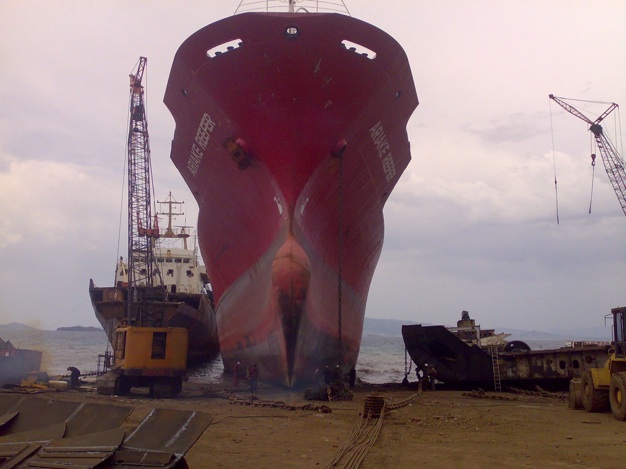Introduction Ship-recycling

The steady withdrawal of older ships and their replacement by new tonnage is a natural technological process allowing the introduction of safer and more environmentally friendly designs, greater operating efficiency and a general reduction in marine risks.
In general, ships are not scrapped but recycled, conforming to one of the basic
principles of sustainable development. Recycling is defined by the World Wildlife Fund as “the processing of waste or rubbish back into raw materials so that it can be made into new items. It is undoubtedly beneficial – to the individual, the community and the planet.” (Source: WWF-UK Recycling Fact Sheet)
In the process of recycling ships, virtually nothing goes to waste. The materials and equipment are almost entirely reused. Steel is reprocessed to become, for instance, reinforcing rods for use in the construction industry or as corner castings and hinges for containers. Ships’ generators are reused ashore. Batteries find their way into the local economy. Hydrocarbons on board become reclaimed oil products to be used as fuel in rolling mills or brick kilns; light fittings find further use on land etc. Furthermore, new steel production from recycled steel requires only one third of the energy used for steel production from raw materials. Recycling makes a positive contribution to the global conservation of energy and resources and, in the process, employs a large, if predominantly unskilled, workforce. Properly handled, ship recycling is, without question, a “green” industry.
However, while the principle of ship recycling may be sound, the working practices and environmental standards in the yards often leave much to be desired. While ultimate responsibility for conditions in the yards has to lie with the countries in which they are situated, there is a corresponding responsibility on the shipping industry to do what it can to minimise potential problems in the yards.
A vessel may be sold and bought several times during its economic life. When a ship operator decides to sell a vessel which, for whatever reason, no longer meets his requirements, he will seek a buyer for his asset and appoint an agent, a “broker”, to act on his behalf.
“Brokers” specialise in matching the seller with prospective buyers and facilitating communication and negotiations between them.
For many shipowners, the sale of a ship for whatever reason brings with it considerable commercial risk. If the market falls between the time that the contract is concluded and the delivery of the vessel, the shipowner will be concerned that the end buyer will look very closely at the terms of the contract to find reason to cancel the contract and/or to renegotiate at a lower price.
Many shipowners, and their appointed brokers, prefer to avoid this commercial risk by selling to an intermediate buyer who is a specialist in the business and has knowledge and contacts not typically possessed by shipowners, for whom selling a ship is an infrequent activity.
The middle buyer will then sell the ship on to the end buyer, perhaps via a broker acting on behalf of a recycling company. In such circumstances, the decision on which recycling company to select rests with the middle buyer rather than the shipowner.
Generally, potential buyers also appoint brokers, who may be acting on behalf of clients who are seeking vessels to operate in further trading, or on behalf of recycling yards who are seeking to purchase vessels with a potentially high residual “scrap” value. The seller’s broker will be seeking the best return for his client. The sale and purchase of the vessel is generally conducted between the brokers. This may happen several times during the life of the vessel. A shipping company seldom deals directly, or even indirectly, with a recycling yard and, therefore, usually has little opportunity to influence its selection.
Some brokers, however, specialise in obtaining vessels for recycling. Once a vessel is obtained, these brokers will usually offer the vessel for sale for recycling, sometimes “as is” (in relation to its current geographical and physical condition), to one or more cash buyers, usually via another broker, with the contract stipulating the general area of delivery. The cash buyer will select the actual yard, normally at a later date, and his role in obtaining details of the vessels purchased, and passing these details to the recycling yard, is, therefore, vital.
